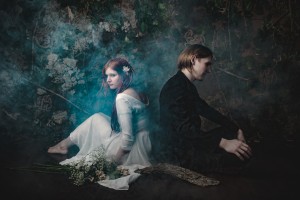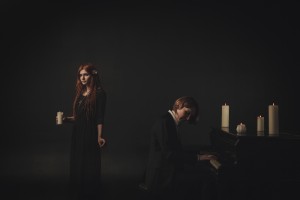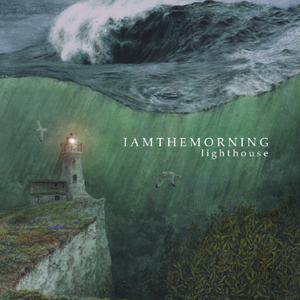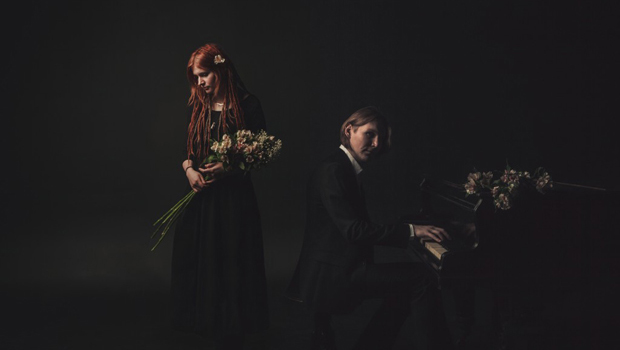[With photos by Alexander Kuznetcov]
One of the most gorgeous releases of 2016 so far, Lighthouse by iamthemorning has seen the Russian duo of Gleb Kolyadin and Marjana Semkina build on the success of their previous releases and deliver a definitive statement. TPA’s Jez Rowden spoke to Marjana Semkina about the process of creating Lighthouse and other aspects of their work.
Hi Marjana, thanks for taking the time to speak to TPA about your new album, Lighthouse.
Have you always sung? What drew you to singing in the first place?
Yeah I’ve been singing as long as I can remember, but it wasn’t anything serious until around 2008 when I started to actually make music with other musicians. I don’t think there was a particular thing in my life that drew me towards this path, maybe the fact that my parents always were strongly against me becoming a musician, since I’m a rebel that was the best way to drive me towards musicianship. I don’t think that was what they intended though… 🙂
When did you first sing in public and what was the reaction?
Ha, that was years ago. I think I was 7 years old and I sang a Beatles song at a school concert. It felt quite weird and I don’t remember the reaction really, I wish we had a footage of tiny me singing in bad English!
How did you and Gleb meet and was the formation of iamthemorning an obvious decision from the start?
 The fact that we would make music together was obvious from the start, it just clicked, it worked as soon as we first tried to play something together. To make things less awkward (we didn’t even know each other when a friend recommend us trying to play together) we started with playing Björk covers when he first came to my place shortly after I got a piano – but very soon (on the very first meeting) I showed him some of my “ideas” and this was immediately the start of our first album – though we had no idea it would end up in being an album. Within the first 3 to 4 meetings we had several songs for ~ completed. Sometimes people just match, that’s us.
The fact that we would make music together was obvious from the start, it just clicked, it worked as soon as we first tried to play something together. To make things less awkward (we didn’t even know each other when a friend recommend us trying to play together) we started with playing Björk covers when he first came to my place shortly after I got a piano – but very soon (on the very first meeting) I showed him some of my “ideas” and this was immediately the start of our first album – though we had no idea it would end up in being an album. Within the first 3 to 4 meetings we had several songs for ~ completed. Sometimes people just match, that’s us.
The name iamthemorning comes from a song by Oceansize. I loved and miss them, what did the song mean to you?
I love and miss them too. The song has a very lovely and uplifting mood, but it’s more for its title really. I always thought its a very good name so we used it, mostly because we had no idea we’d come so far.
What is the process for writing iamthemorning songs?
It varies. Sometimes we just sit at the piano and play and come up with new tunes, it’s really easy and natural for us. If we don’t see each other a lot, we just compose separately and exchange drafts that later turn into songs. Lighthouse was mostly composed this way, songs started from Gleb’s drafts that I worked on, I think half of it. The other half was a result of our improvisations.
How would you describe the music of iamthemorning?
Gentle sad songs with sophisticated arrangements, a lot of strings and beautiful piano.
I have to ask, what is your first album actually called!?
“~” 🙂
Ha, not the easiest one to refer to then! As it’s the geometrical symbol for ‘similarity’ maybe that’s an idea…
The first release I heard was the Miscellany EP, the purity and beauty of it just left me stunned. Was there a reason why you chose to record an EP between your first and second albums?
Yes, actually. We ran a crowdfunding campaign to produce Belighted and had our responsibilities. The process of making Belighted took much longer than we expected so, not to upset people who were waiting for it for so long, we released Miscellany and sent out the digital copies for free to all backers of the campaign. It’s called that because it’s really a collection of not very connected pieces that shows all aspects of the band in brief. New material, old material, full band sound, chamber sound and duo. It was a logical connection between ~ and Belighted.
Signing to Kscope and releasing Belighted dramatically increased your international profile and Lighthouse will no doubt expand it further. Do you find this an easy thing to deal with?
 It becomes harder, because I got used to keeping the personal connection with the fans. I love talking to them, properly replying to messages and emails, letting them feel our presence as real people behind everything we do. I ship Bandcamp orders personally and I love the personal touch to it: postcards, signed CDs, paper cranes that I fold myself, specific pretty packaging. With the expansion of our fanbase it becomes more complicated since I also have a full time job, I work 5 days a week, so I have less and less time and it upsets me. But it’s also a great pleasure to see how the amount of our listeners increases. It’s amazing.
It becomes harder, because I got used to keeping the personal connection with the fans. I love talking to them, properly replying to messages and emails, letting them feel our presence as real people behind everything we do. I ship Bandcamp orders personally and I love the personal touch to it: postcards, signed CDs, paper cranes that I fold myself, specific pretty packaging. With the expansion of our fanbase it becomes more complicated since I also have a full time job, I work 5 days a week, so I have less and less time and it upsets me. But it’s also a great pleasure to see how the amount of our listeners increases. It’s amazing.
How is your music regarded back home in Russia?
Not as good as it is in Europe. I do have a feeling that people in Russia don’t have faith in Russian musicians so no matter how hard you try, masses will not take you seriously, you will always remain just a simple kid form St. Pete trying to get out. No matter that we’ve already managed to get out and our scale is big now: Russians will always find a reason to say something bad about you.
Gavin Harrison has played on several of your recordings and now Colin Edwin is also on board. How did you get in contact with them?
The Internet is a magical thing! 🙂
And how did Mariusz Duda get involved? Your duet with him on the title track of Lighthouse is breathtaking.
Thank you! Mariusz and I have been good friends for a couple of years now. We met back in 2013 when iamthemorning supported Riverside in Russia, and we’ve been in touch since then. I also seem to be very lucky because I chose a proper moment to ask him to sing with us, he loved the track and was happy to contribute.
The various other singers and musicians who perform on the album add much to the flavour and texture of the songs. Where do they come from and do you work with the same people regularly?
No, we don’t. We used to have a couple of string players that were playing with us since 2012 and until this summer, but they have their lives so they left, too. Lighthouse is a very “studio” project and we didn’t limit ourselves to only using the means that we’ll be able to use in live performances (I suspect those will sound very different). If we felt like a song called for something specific, we used it. Like, for example, bombard or childrens choir.
All the string players and wind players are from Russia, the guitarist is from Canada, and bodhran and other percussions were played by Evan Carson, a U.K. based percussionists from a band called Stark. Also, Colin and Gavin, obviously!
I notice that you and Gleb have self-produced Lighthouse. The results are gorgeous. Is this a process that you enjoy?
Actually, we always self-produced everything we’ve done, but this time we had much more creative control due to decreased amount of guitars on the album. We love the process very much, it’s one of our favourite parts actually.
Are the basic song demos just piano and voice to which you add the other elements into the arrangements?
No, this time every tiny detail was in the demo. Gleb did an astounding job making sure we knew exactly what we needed for which song, so the result was exactly what we wanted it to be.
The Perezvony Choir features on Sleeping Pills and the result is dazzling. Is it obvious from the writing stage when the addition of a choir or other element is required or does this become apparent over time?
Sometimes we know it exactly from the start, but sometimes something comes in right at the end of the process. It’s a natural thing, we just listen to how each song arrangement shapes and think what to add to make it better – or maybe what to get rid of.
Lighthouse seems like a return to your earlier, sparser style in many ways after the rockier Belighted. Was this a concious decision?
Oh yes, it was. We’re happy with the way things are. Belighted was very much of a compromise with a result that was unexpected even for us. This time, we could allow ourselves to do all sorts of strange stuff so this album is much more natural for iamthemorning than Belighted.
I see that the album has a concept with lyrical inspiration from Virginia Woolf and Sylvia Plath. Can you explain what it is about?
It’s a story about progression of mental illness. It has a particular plot and protagonist and we are watching her struggling with her demons and losing (or not!) the battle.
The music is so uplifting, why are the themes behind it so dark?
I do find it fascinating to have this contrast between the subject matter and the sound. You know the song by Porcupine Tree, Drown with me? If you do then you probably know what I’m talking about. I do think also that you can sing about the sad things without too much drama. You know how the topic of mental illness is not often raised by people, although I think it should be addressed with much more attention to details and care. That’s what I try to do: address the subject in a calm manner, make people think, make people listen and realize certain things.
The artwork for Lighthouse is also striking, can you tell us what part of the story that conveys?
 When our artist started working on the cover, I sent him pictures of Beachy Head and the lighthouse on it and asked him to draw it, but drowned in water. There is a double meaning behind it: the lighthouse is a guiding light and though everything is covered in water and the whole world seems to be drowning, there still is hope because it’s glowing. Alternatively, it speaks to the protagonist of the album: the guiding light takes us into the sea and under water, implying that probably it’s better to leave the struggles behind and give yourself up to the waves.
When our artist started working on the cover, I sent him pictures of Beachy Head and the lighthouse on it and asked him to draw it, but drowned in water. There is a double meaning behind it: the lighthouse is a guiding light and though everything is covered in water and the whole world seems to be drowning, there still is hope because it’s glowing. Alternatively, it speaks to the protagonist of the album: the guiding light takes us into the sea and under water, implying that probably it’s better to leave the struggles behind and give yourself up to the waves.
Your music doesn’t fit within any particular genre – it just is what it is. What was the music that inspired you originally and what current artists continue to do so?
I think it is what it is because Gleb and I are equally involved in its creation and we are so very different, him with classical music running in his veins and me with my love to prog and artists like Nick Drake – we bring all our influences into what we do and we have this mixture. So he, obviously, was very much inspired by classical music, but apart from that he’s a big fan of Mike Oldfield and Brian Eno. I love mellow acoustic stuff like Nick Drake or Elliott Smith in addition to all the Prog that I listen to.
There’s a fragile humanity in the music of iamthemorning, a purity that draws the listener in. Do you have to drop pieces that don’t fit within the format of what iamthemorning is?
We never drop anything at all, we are very focused on the result and therefore we finished every single song we originally planned for the album and used them all. We also don’t try to fit into any kind of limits, genres, we just do what we do and I think it should be rather consistent because both of us have a very clear understanding about what we like about music and what we’d like our music to be, and we follow our views and remain faithful to our taste.
Gleb recorded his grand piano at the historic Mosfilm Studios in Moscow where the orchestral soundtracks for the films of Sergei Eisenstein and others were recorded. What was that like as an experience?
This was a beautiful experience! Best studio in Russia, the biggest and oldest one, incredible history and atmosphere. I hope we’ll be able to record an orchestra there one day. 🙂
Do you enjoy the live shows?
Very much. More than anything I wish we could go touring Europe properly. Nothing can beat the energy of a live performance, especially in music that is focused on emotion.
And hopefully we’ll get to see you play more widely soon.
Thank you so much for sharing your thoughts with The Progressive Aspect, it’s very much appreciated, and good luck with Lighthouse!
Thank you 🙂
LINKS
Iamthemorning – Website | Iamthemorning on Kscope | Facebook | Bandcamp | Twitter

